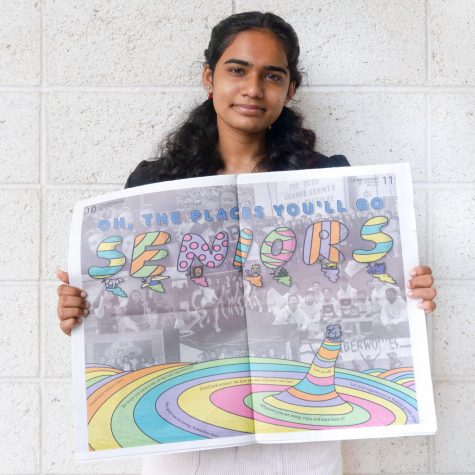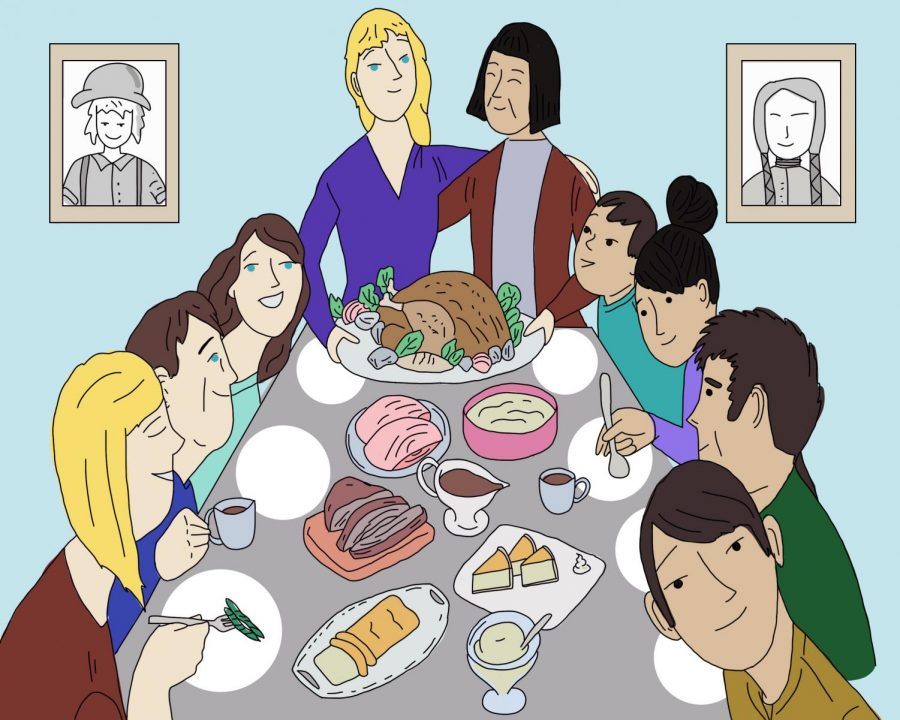We Should Celebrate Thanksgiving Despite its History
A family can celebrate Thanksgiving while still understanding and acknowledging its history. Thanksgiving’s story is important, but the holiday has modernized into a different meaning.
Shortly after the first Thanksgiving, the Pilgrims began to take away land from the Native Americans. In turn, this led to the relocation of many indigenous tribes and ultimately the decimation of several populations.
Although the Pilgrim-Native American conflicts have contributed to a grim history surrounding the holiday, we should continue to celebrate Thanksgiving because of its modernization over the years.
While it is important to understand the context behind the first Thanksgiving in Plymouth, Massachusetts, in 1621, people today should reflect on the importance of being thankful for blessings, family, food, shelter and money.
“The history of Thanksgiving is pretty dark, but I like to think the holiday is a holiday to be thankful and appreciative of our family while also reconsidering the grim history,” junior Jonathan Truong said. “I think it should be celebrated only to appreciate what we have and to be thankful.”
A poll conducted by LifeWay Research in 2015 showed that 56% of Americans spend the holiday being thankful for God and their blessings, while 39% spend the time with family or friends. In total, 95% of Americans continue to celebrate the holiday.
“I think the deeper meaning of Thanksgiving is to just be thankful and appreciative of what we have and how we got here as a country,” Truong said.
In 2020, people should address Thanksgiving not for its history but for its ability to make people acknowledge why they are thankful. While it is still a time of mourning, Americans can opt to discuss present-day issues rather than those of 1621.
“People don’t think about Thanksgiving and immediately remember the Pilgrims; I don’t think that’s your association,” social studies teacher Shameemah Motala said. “I think now it’s become more of a time where everyone has the day off, and it’s like the one time in the year where everyone can get together and be free from work and school and everything like that.”
Nevertheless, the history of Thanksgiving continues to be dark, and many Americans criticize the actions of the Pilgrims.
“I definitely think that it should always be brought up together, like if you’re going to bring up Thanksgiving and that dinner with the Pilgrims, you should always bring up the fact that the indigenous populations have suffered and continue to suffer in this country,” Motala said.
Understanding the history of Thanksgiving is something everyone should be able to do, but the choice of whether or not to celebrate Thanksgiving should not be based on its history.
Your donation will support the student journalists of Portola High School. Your contribution will allow us to purchase equipment and cover our annual website hosting costs.

Aadi Mehta is serving as a second-year Portola Pilot Staff Writer for the 2021-2022 school year. Aadi is excited to be able to work with new and returning...

Dheeksha Bhima Reddy is the co-Editor-in-Chief for her third and final year on the Portola Pilot. Through her newfound obsession of drinking coffee (cold...





Maria | Dec 19, 2021 at 11:12 pm
Thanksgiving dinner is not a meal you make or eat by yourself.
The definition of Thanksgiving is to bring people together and to give thanks for being together with God’s grace.
Bill Jones | Nov 25, 2021 at 5:29 pm
Indigenous / First-Nation Americans did not and do not suffer *because of* the Pilgrim-Indian Thanksgiving.
The history of European and European-descended communities and Native communities is rough, to put it lightly.
But Thanksgiving has nothing to do with conquest or violence. It was the European settlers–the first generation of immigrant Americans–who were in danger . . . and saved by the Native peoples. That in and of itself is something to cherish.
Nate Taylor | Dec 3, 2021 at 9:55 am
Hm. I love to argue. The history of Thanksgiving have been perverted. There was no happy feast between the Wampanoags tribe and pilgrims. Even with the most charitable interpretation the first thanksgiving was a political function.
What I would argue is now native american tribes DO suffer because of this myth. American settlers get to pretend there was unity and feign ignorance. Sure it’s good people can come together but what does that matter if its built on a myth?
I recommend you do more research on this topic.
(Some good basic article to read are “The Invention of Thanksgiving” by Philip Deloria or “The Myths of the Thanksgiving Story and the Lasting Damage They Imbue” by Claire Bugos.)